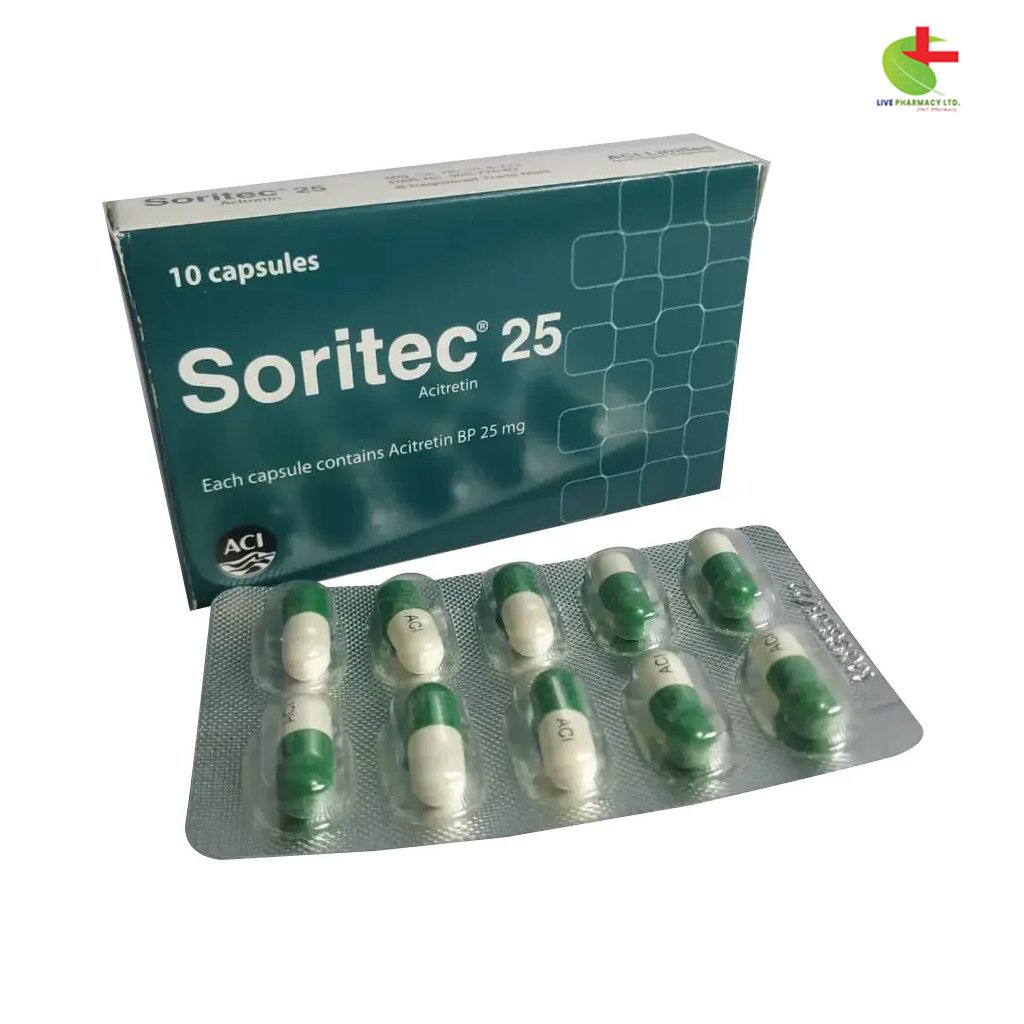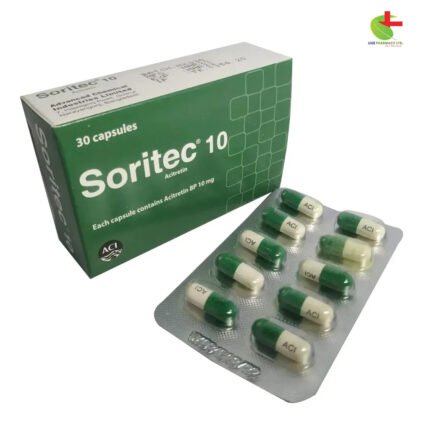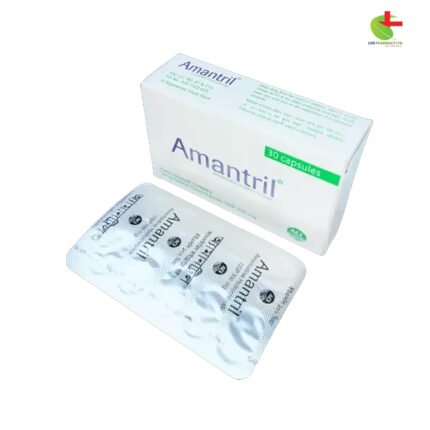Soritec 25
852.60৳ Strip (10 pcs)
- Soritec is used to treat severe psoriasis, including palmo-plantar pustular psoriasis and Darier’s disease.
- Contains Acitretin, a retinoid that regulates skin cell growth and differentiation.
- Typically prescribed for adult patients with conditions resistant to other treatments.
- Dosing is adjusted based on patient response; always follow healthcare professional advice.
 Brand
Brand
|
ACI Limited |
|---|---|
 Generics
Generics
|
Acitretin |
 Type
Type
|
Tablet |
Indications
Soritec is indicated for the treatment of severe, extensive psoriasis, particularly when resistant to other therapies. It is also used for conditions such as palmo-plantar pustular psoriasis, severe congenital ichthyosis, and severe Darier’s disease (keratosis follicularis).
Always follow the guidance of a registered healthcare professional when using this medication.
Pharmacology
Acitretin, the active ingredient in Soritec, is a retinoid, a synthetic form of vitamin A. Though its exact mechanism of action is not fully understood, it is known to influence a range of cellular activities, such as RNA/DNA synthesis, regulation of epidermal proliferation, and modulation of the immune system. Acitretin’s primary action is the normalization of skin cell differentiation, which helps restore healthier skin growth patterns.
Dosage & Administration
- Adults and Elderly: Start with a daily dose of 25 mg to 30 mg for 2 to 4 weeks. After this initial phase, adjust the dosage based on response and any side effects. Typically, the dose is increased to 25–50 mg/day for 6 to 8 weeks to achieve optimal therapeutic outcomes, with a maximum dose of 75 mg/day if necessary.
- Darier’s Disease: Begin with 10 mg/day and increase cautiously, as this condition may cause isomorphic reactions. For severe congenital ichthyosis and Darier’s disease, treatment may extend beyond 3 months, but the dosage should not exceed 50 mg/day.
- Children: The recommended dosage is around 0.5 mg/kg/day. In some cases, up to 1 mg/kg/day may be needed for limited periods, but this should not exceed 35 mg/day.
Always consult a healthcare professional before beginning treatment.
Drug Interactions
- Ethanol: Avoid using Soritec with alcohol, as it can lead to the formation of etretinate.
- Contraindicated Drugs: Do not take Soritec with methotrexate, tetracyclines, other retinoids, or vitamin A due to the risk of adverse interactions.
- Phenytoin: Soritec can reduce phenytoin‘s protein binding, so use caution.
- Contraception: Low-dose progesterone-only contraceptives (minipills) may be ineffective during Soritec treatment.
- Warfarin: There are no significant interactions between Soritec and warfarin.
Contraindications
- Pregnancy: Acitretin is highly teratogenic and must not be used during pregnancy or by women who could become pregnant during or within 2 years after treatment.
- Breastfeeding: Not recommended for breastfeeding women.
- Hepatic and Renal Impairment: Contraindicated in patients with severe liver or kidney issues.
- Hypervitaminosis A: Avoid concurrent use of other retinoids or vitamin A, as it increases the risk of toxicity.
- Hypersensitivity: Do not use in patients allergic to acitretin or its components.
Side Effects
Most side effects are dose-related and generally mild, particularly when Soritec is used at the prescribed dose. Common side effects include:
- Skin and mucous membrane irritation
- Initial worsening of psoriasis symptoms
- Dryness and irritation
Side effects tend to diminish as the body adjusts to the treatment, but they may still occur during the dosage adjustment phase.
Pregnancy & Lactation
- Pregnancy: Acitretin is contraindicated for pregnant women due to its teratogenic effects. It should be avoided during pregnancy and for 2 years after discontinuation of the medication.
- Breastfeeding: The use of Soritec during breastfeeding is not recommended due to the potential risks to the infant.
Precautions & Warnings
- Teratogenic Risk: Women of childbearing potential must not use Soritec without strict contraception measures. Blood donation by patients undergoing treatment is prohibited during and for 2 years after treatment.
- UV Sensitivity: Retinoid therapy can increase sensitivity to sunlight. Patients should minimize exposure to UV light and use sunscreen.
- Liver & Lipid Monitoring: Liver function, cholesterol, and triglyceride levels should be monitored regularly throughout treatment, especially during long-term therapy.
- Glucose Tolerance: Soritec can alter glucose metabolism, so blood sugar levels should be monitored.
- Alopecia and Night Vision: Hair thinning and night vision issues may occur during treatment. Seek medical advice if you experience severe symptoms like headache, visual disturbances, or nausea.
Overdose Effects
Overdose symptoms are similar to acute Vitamin A toxicity and may include:
- Severe headache, dizziness, nausea, and vomiting.
- Irritability, itchiness, and skin issues may also occur.
Treatment is generally symptomatic, as Soritec has low acute toxicity.
Therapeutic Class
Oral Retinoid Preparations
Storage Conditions
Store Soritec in a cool, dry place, protected from light. Do not store above 25°C. Keep away from children.













Reviews
There are no reviews yet.